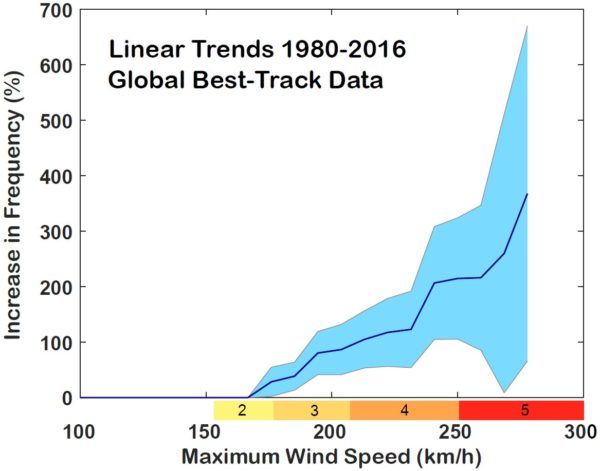Does global warming make tropical cyclones stronger? (Yes)
In the long term, whether we will see fewer or more tropical cyclones in the Atlantic or in other basins as a consequence of anthropogenic climate change is still much-debated. There is a mounting consensus, however, that we will see more intense hurricanes. So let us revisit the question of whether global warming is leading to more intense tropical storms. Let’s take a step back and look at this issue globally, not just for the Atlantic.
...
One consequence of this increase is that in most major tropical cyclone regions, the storms with the highest wind speeds on record have been observed in recent years (see Fig. 1 based on reanalysis by Velden et al. 2017). The strongest globally was Patricia (2015), which topped the previous record holder Haiyan (2013).
Other recent records are worth mentioning. Sandy (2012) was the largest hurricane ever observed in the Atlantic. Harvey (2017) dumped more rain than any hurricane in the United States. Ophelia (2017) formed further northeast than any other Category 3 Atlantic hurricane – fortunately it turned north before striking Portugal, against initial predictions, and then weakened over cool waters before it hit Ireland. September 2017 broke the record for cumulative hurricane energy in the Atlantic. Irma (2017) sustained wind speeds of 300 km/h longer than any storm on record (for 37 hours – the previous record was 24 hours by Haiyan in 2013). Cyclone Pam in March 2015 was already beaten again by Winston in February 2016 according to the Southwest Pacific Enhanced Archive for Tropical Cyclones (though not in Velden’s data analysis). Donna in 2017 was the strongest May cyclone ever observed in the Southern Hemisphere. All coincidence?
...

...
Most damage caused by tropical storms is not directly caused by the wind, but by water: rain from above, storm surge from the sea. Harvey brought the largest amounts of rain in US history – the probability of such a rain event has increased several times over recent decades due to global warming (Emanuel 2017; Risser and Wehner, 2017; van Oldenborgh et al., 2017). Not least due to global warming, sea levels are rising at an accelerating rate and storm surges are becoming more dangerous. A recent study (Garner et al. 2017), for example, shows that the return period of a certain storm surge height in New York City will be reduced from 25 years today to 5 years within the next three decades. Therefore, storm surge barriers are the subject of intensive discussion in New York (Rahmstorf 2017).
http://www.realclimate.org/index.php/archives/2018/05/does-global-warming-make-tropical-cyclones-stronger/
